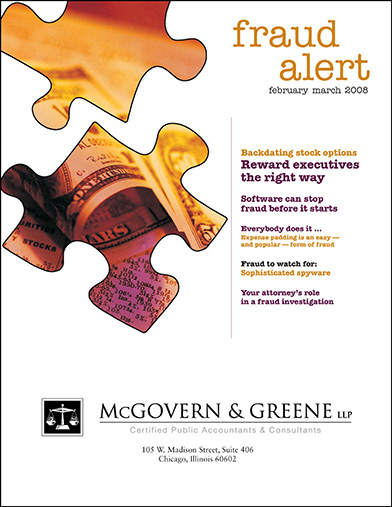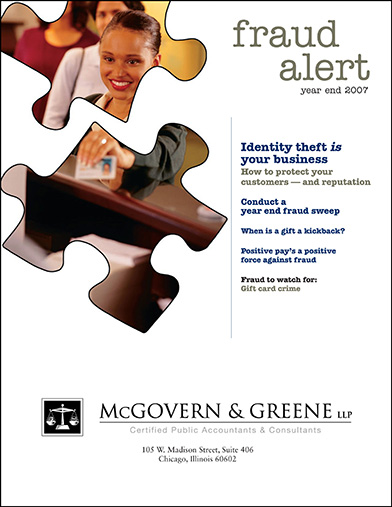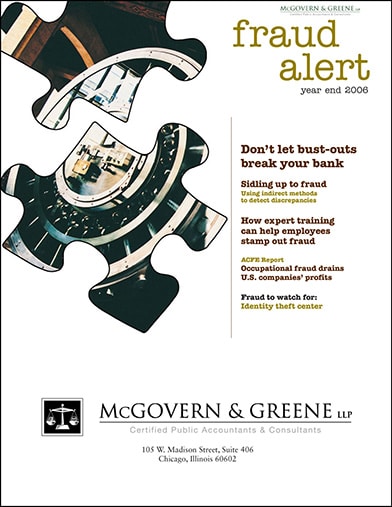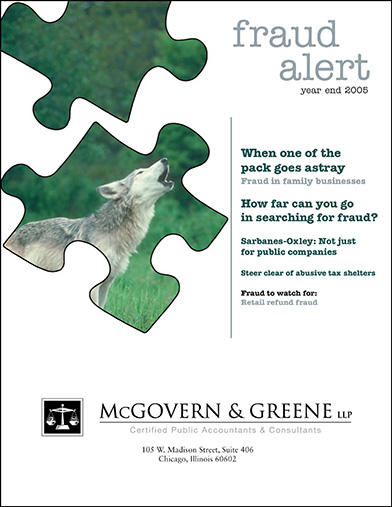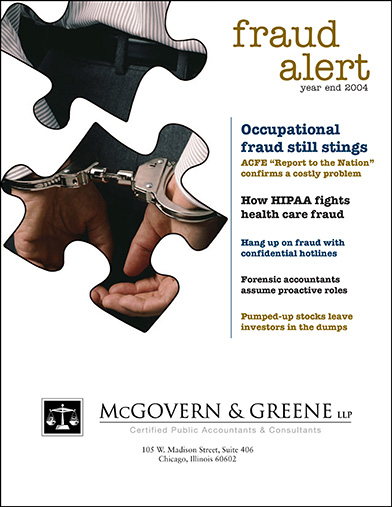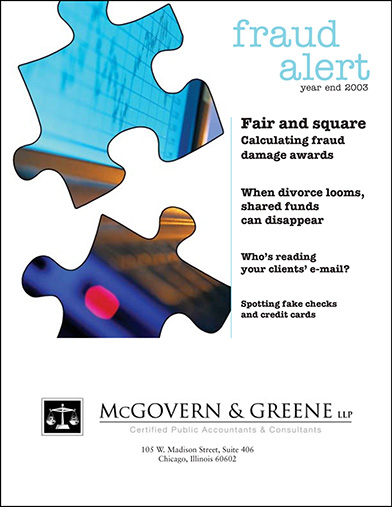Fraud Alert Magazine

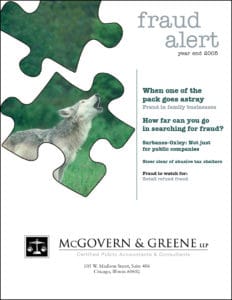 YEAR END 2005 Issue of Fraud Alert
YEAR END 2005 Issue of Fraud Alert
When one of the pack goes astray
Fraud in family businesses
Trust is one of the things that makes family businesses such appealing places to work. But it also makes them more vulnerable to fraud. This article explains how family members can uncover fraud in their company and deal with the perpetrator with minimal negative publicity. It also suggests that family businesses prevent fraud from happening in the first place by including outsiders on its board of directors.
How far can you go in searching for fraud?
Employers generally have the right to perform workspace searches, but should approach them with care. Laws vary widely from state to state, but most allow businesses to search company-owned computers, desks, lockers and other personal workspace equipment as long as the company policy clearly states it has the right to inspect its property at any time and there are justifiable reasons for the search.
Sarbanes-Oxley: Not just for public companies
The Sarbanes-Oxley Act of 2002 (SOX) holds publicly traded companies to stringent corporate governance and financial reporting standards. Private companies aren’t required by law to comply with SOX provisions, but as heightened sensitivity to financial irregularities becomes widespread, private companies may find it difficult to stay in business if they don’t adopt at least some of the act’s provisions. These might include prohibiting related-party transactions and appointing a compensation committee to oversee executive salaries.
Steer clear of abusive tax shelters
Abusive tax shelters are complex transactions that have no legitimate business purpose and are used solely to reduce or eliminate tax liability in manners never intended by the tax code. However tempting the chance to save on taxes, businesses should avoid these tax shelters at all costs. This article explains how.
Fraud to watch for: Retail refund fraud
Refund fraud is a significant thorn in loss-prevention specialists’ sides as merchants struggle to keep customers without losing their shirts. This short article provides tips on minimizing refund fraud, including requiring proof of purchase for all refunds and refunding only a limited amount in cash.
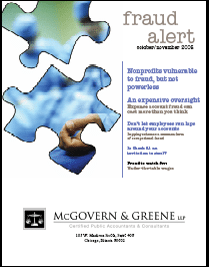 OCT/NOV 2005 Issue of Fraud Alert
OCT/NOV 2005 Issue of Fraud Alert
Nonprofits vulnerable to fraud, but not powerless
Nonprofit organizations (NPOs) may by their very nature be more vulnerable to fraud than their corporate brethren. Their business, which can involve significant cash donations, is usually conducted by a mix of volunteers and employees who may be dedicated to the NPO’s mission but aren’t necessarily savvy businesspeople. This article identifies the warning signs of fraud and how NPOs can prevent fraud through background checks, transaction authorizations and the segregation of duties.
An expensive oversight
Expense account fraud can cost more than you think
There are as many ways to cheat on an expense account as there are employees willing to cheat. Common schemes include mischaracterizing expenses, requesting multiple reimbursements for the same item, overstating expenses and inventing expenses. This article provides tips on spotting these forms of fraud.
Don’t let employees run laps around your accounts
Lapping schemes a common form of occupational fraud
Lapping, or using receipts from one account to cover theft from another, is easy money for fraudsters and relatively easy to conceal. Employers can prevent this type of fraud, however, by knowing the warning signs of lapping and implementing effective internal controls.
Is Check 21 an invitation to steal?
The Check Clearing for the 21st Century Act (Check 21) is expected to speed check processing and cut banks’ costs nationwide. But there is also some question about whether it will also help financial institutions reduce fraud—or make fraud easier to perpetrate. This article explores ways fraud perpetrators may try to exploit Check 21.
Fraud to watch for: Under the table wages
The cost of paying employees with unreported cash can be significant. Employers can be personally liable for federal income and FICA taxes not withheld from employees’ wages. When it comes to payroll, companies are much better off putting everything on the table.
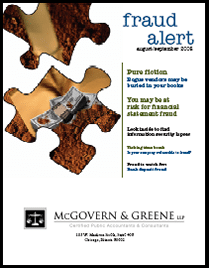 AUG/SEP 2005 Issue of Fraud Alert
AUG/SEP 2005 Issue of Fraud Alert
Pure fiction
Bogus vendors may be buried in your books
Fictitious vendor fraud is generally perpetrated by someone with the authority to approve payments. While it is easier to perpetrate in companies with a large number of vendors, even smaller businesses can fall victim to the scheme. Companies can spot the fakes by looking for, among other things, customer records with missing vital information and invoice amounts just below the fraudster’s authorization limit.
You may be at risk for financial statement fraud
Financial statement fraud involves any intentional misstatement or omission in financial statements. But at least half of it is in revenue recognition—or recognizing revenue prematurely, reporting unearned revenue and reporting falsified sales. This article explains how to spot fraudulent statements and weed out those responsible for them.
Look inside to find information security lapses
Despite all the headlines about phishers and hackers, most breaches of information security are internal. To be effective, a company’s senior managers must be convinced that security controls are a necessary expense, and staff must be trained to detect and report any possible misuse of company computers.
Ticking time bomb
Is your company vulnerable to fraud?
Virtually every company can benefit from a risk assessment performed by a fraud expert. Fraud experts look for a number of factors that make a company more vulnerable, including owning hard assets easily convertible to cash, a corporate climate of fear, domineering management and frequent overrides of internal controls.
Fraud to watch for: Bank deposit fraud
To stop unscrupulous employees from perpetrating fraud, companies must diligently monitor procedures for getting money to the bank. This means that more than one person should prepare deposits, enter them in the books and reconcile statements. At least two people should also physically deliver each deposit.
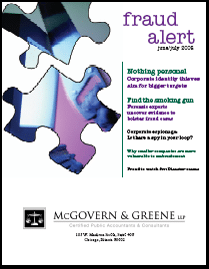 JUN/JUL 2005 Issue of Fraud Alert
JUN/JUL 2005 Issue of Fraud Alert
Nothing personal
Corporate identity thieves aim for bigger targets
While personal identity theft gets all the media attention, corporate identity theft is also a growing problem about which businesses should be aware. Corporate identity thieves use a number of approaches to adopt the identities of legitimate businesses and perpetrate a variety of scams. These include exploiting weaknesses in Web sites to steal customer lists or sales databases or to hijack emails.
Find the smoking gun
Forensic experts uncover evidence to bolster fraud cases
Forensic evidence — financial data, correspondence and, increasingly, various types of electronic files — is the foundation upon which many fraud cases are built. While compiling information that can be used as evidence and help win a case can be challenging, forensic accountants and other fraud experts can help.
Corporate espionage: Is there a spy in your loop?
Corporate espionage happens regularly in the United States, but companies can take steps to prevent the theft of their intellectual property or trade secrets. These include identifying what information needs to be protected, whom it needs to be protected from and where vulnerabilities lie.
Why smaller companies are more vulnerable to embezzlement
Small business owners and managers want to believe their employees are trustworthy. While most are, small companies disproportionately fall victim to embezzlement or the illegal appropriation of money or property. This article explains why and suggests several simple embezzlement prevention measures.
Fraud to watch for: Disaster scams
This short article provides tips on avoiding disaster scams and ensuring corporate donations go for their intended purpose.
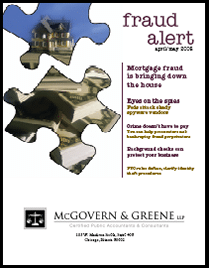 APR/MAY 2005 Issue of Fraud Alert
APR/MAY 2005 Issue of Fraud Alert
Mortgage fraud is bringing down the house
Mortgage-related fraud schemes are on the rise: Between 2001 and 2004, FBI mortgage fraud investigations increased more than fivefold. Lenders can protect themselves from mortgage fraud by being aware of the most common scams — equity skimming, property flipping and identity theft — and by working with law enforcement and government agencies.
Eyes on the spies
Feds attack shady spyware vendors
Spyware, or programs Web surfers unknowingly install on their computers by clicking on links or opening applications, range from the annoying to the truly damaging. Recently, the Federal Trade Commission filed suit against businesses that created spyware simply so they could sell consumers the means to remove it. This article discusses this and other antispyware initiatives.
Crime doesn’t have to pay
You can help prosecutors nab bankruptcy fraud perpetrators
About 10% of bankruptcy cases involve some kind of fraud or other abuse. Businesses can help catch and prosecute bankruptcy fraud perpetrators by investigating suspicious customers or associates with the help of a forensic accountant.
Background checks can protect your business
Companies lose millions of dollars every year because they hire the wrong people. While not always required, background checks can tell employers whether job candidates have criminal records, inaccurate resumes or a history of financial mismanagement. This article provides advice on hiring a background screening service.
FTC rules define, clarify identity theft procedures
As this short article explains, the Federal Trade Commission recently issued final rules regarding identity theft. Among other provisions, these rules allow identity theft victims to place fraud alerts on their credit files.
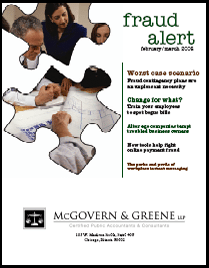 FEB/MAR 2005 Issue of Fraud Alert
FEB/MAR 2005 Issue of Fraud Alert
Worst case scenario
Fraud contingency plans are an unpleasant necessity
Businesses that haven’t established a fraud contingency plan aren’t fully prepared for all the emergencies a company can face. This article explains how to create a plan that will minimize damages, protect evidence, maintain client relations and deal with media publicity arising from employee fraud.
Change for what?
Train your employees to spot bogus bills
Thanks to the increasing sophistication of personal computers, currency counterfeiters are creating more realistic-looking bills. But businesses can protect themselves from bogus bills by training employees who handle cash to spot common signs of a fake, including blurred images and serial numbers that aren’t uniformly spaced.
Alter ego companies tempt troubled business owners
Faced with impending financial collapse, some companies create alter ego companies to hide assets from creditors. This article discusses the difference between legitimate subsidiaries and alter ego companies and how to identify the fraudulent organizations.
New tools help fight online payment fraud
Identity theft, phishing and other forms of online fraud are reaching epidemic proportions. But new technology is helping to fight Internet scammers and protect both consumers and businesses.
The perks and perils of workplace instant messaging
The short article provides tips on defending instant messaging programs from hackers.
This publication is distributed with the understanding that the author, publisher and distributor are not rendering legal, accounting or other professional advice or opinions on specific facts or matters, and, accordingly, assume no liability whatsoever in connection with its use.
GFAS Fraud Alert Archives
Expert Forensic Accounting Services
Chicago | Las Vegas
FORENSIC ACCOUNTING
SERVICES
Insurance Claims
Accounting Investigations
Mergers & Acquisitions
Due Diligence Reviews
Dispute Advisory Services
Special Examinations
Contract Audits and Recoveries
LITIGATION SERVICES
Expert Witness Testimony
Commercial Damages
Shareholder/Partner Disputes
Bankruptcy and Insolvency
CPA Malpractice Claims
Contract Disputes
Estate and Trust Disputes
Data Mining & Electronic Discovery
FRAUD EXAMINATIONS

